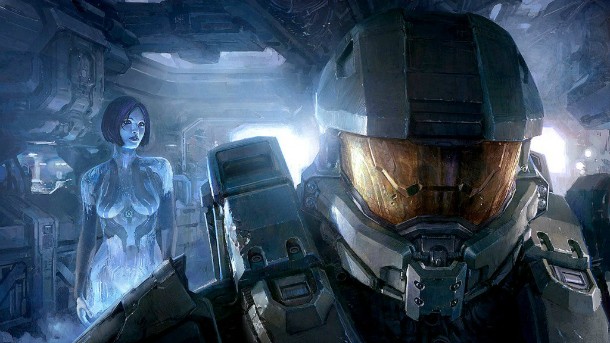How 343 Set A Storytelling Precedent

343 Industries had a colossal task ahead of it when Bungie handed over the reigns to its iconic Halo franchise. Not only were the developers expected to maintain the series’ longtime fans with familiar elements, but deliver a fresh experience as well. As it turns out, 343 was up to the task. In some respects, they even outmatched Bungie.
The Master Chief has made his mark on the roster of memorable video game heroes. He’s a cyborg super soldier enhanced with muscle augmentation and a space-age exoskeleton to boot. Everything about him screams lethal; even his Covenant enemies refer to him as the “Demon.” A rumbling voice and stoic demeanor lend his fellow marines confidence, and by extension, that confidence passes to the player. However, these strengths have their downside. You never got the chance to identify with the Chief. Sure, you were just as excited as he was to return an alien bomb to its owners through a plasma-filled space battle, but outside of badass moments like this, he wasn’t that interesting of a character.
His numb personality was balanced by the super AI Cortana, a constant figure throughout the series. Aside from providing useful intel, she brought a personal touch to proceedings that balanced out the Chief’s melancholy. In fact, ironically, the AI is the more human character of the two. Whereas the Chief’s tone and dialogue are steeped in a static sense of duty, Cortana delivers the story on a more relatable level.
The dynamic between the two could have been compelling throughout the whole series. The Chief was the supposed last surviving member of the Spartan II program; without Cortana, the Chief would be completely alone, while Cortana was almost completely reliant on him. Essentially, their relationship was the one constant that both of them could count on. The Halo trilogy hinted towards deeper seeds in this relationship with Halo 3’s early stages, when Cortana was separated from the Master Chief, but the dynamic never advanced afterwards.
The Halo franchise has always told a story about war on a galactic scale, with the legendary Master Chief at the helm of humanity’s fight. But that story has been cloudy and impersonal. Myriad story elements are explained to the player indirectly, or not at all, in some cases. Because of this, the overarching narrative always seemed to take a backseat to the immediate objective; 343 changed that with Halo 4.
The newest entry accomplishes several storytelling goals: not only does it present the most focused Halo story to date, but it does so in a relatable way. Of course, for anyone playing the game, a galactic war for the fate of humankind isn’t relatable. But a love story can be. It sounds ridiculous to call the relationship between Chief and Cortana such a thing, but that’s what it has evolved into.
343 doesn’t shy away from the fact that the duo is far removed from humanity – John is the last of a group created for a lifetime of military training, while Cortana is a machine, albeit an advanced one – and the story excels because of that. 343 does a good job of not throwing a curveball of melodrama and convoluted character traits at you. John and Cortana still experience the cognitive dissonance that accompanies fighting for complete strangers; emphasizing that makes the real mission all the more compelling.
Cortana’s impending rampancy (the end of an AI’s life cycle, brought about by thinking itself to death) permeates the tension of Halo 4’s pacing. The galactic importance of the Chief’s mission is once again the overarching narrative, but it’s all honed in on the race against time to save Cortana. For the first time in the series the Chief seems human. You’ll hear a hint of concern in his voice or a stutter as he asks Cortana “Are you okay?”
The galactic problems at hand aren’t any less important than the ones in the original Halo trilogy, but they are overshadowed. Here you are, fighting to prevent humanity’s demise, and yet you care more about the personal dilemma at hand. John has never really been human in most senses of the word. He was created for a specific purpose – to fight – and Cortana becomes his first distraction from that duty. There’s a nervous mentality between objectives, as you and the Chief struggle not to worry about Cortana. Each new mission takes you farther away from saving her. In response, Cortana’s attempts to hide her condition and assure the Chief only make her more susceptible to that worry.
When the ends of both the personal and universal conflicts are in sight, you’ll invariably feel guilt for preferring to save Cortana over the entire human race. The objective of the Halo trilogy was always “Save the galaxy,” but Halo 4 manages to boil that down to a more personal objective. Better yet, it doesn’t seem forced, but instead natural and fluid. The series has never boasted characterization on its resume, but 343 has the opportunity to carry this momentum over to the next title, which can’t come soon enough.

Get the Game Informer Print Edition!
Explore your favorite games in premium print format, delivered to your door.
- 10 issues per year
- Only $4.80 per issue
- Full digital magazine archive access
- Since 1991









